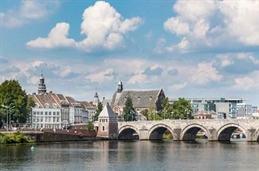
Maastricht Aachen Airport (MST) aims to enhance its network connections with China and boost its overall Asia trade as the hub presents itself as an alternative air cargo gateway to Schiphol Amsterdam Airport (AMS).
Dean Boljuncic, the head of commercial development at Maastricht Aachen Airport, said there are currently some Asian companies operating at the airport to accommodate the growing volume of ecommerce shipments from China, but the airport is also exploring opportunities to help expand Dutch exports to Asia.
He told Asia Cargo News that he’s had recent discussions with Shenzhen Airport and China Southern to try to get more connections to MST from China.
“We’re discussing possibilities, and they said that they used to have a flight from China Eastern; they used to fly to Amsterdam, but it’s not allowed anymore because of air rights and bilateral agreements. We came up with a solution that if they want to have access to the Netherlands, they can use [MST],” Boljuncic said. “So now it’s an ongoing project. This is something definitely that we expect to do, and maybe not China Eastern, China Southern, but a lot of new airlines from China.”
The MST executive said the airport is also collaborating with their Chinese counterparts and Dutch companies to enhance bilateral trade.
“We talk with all the stakeholders; it’s not just an airline; it’s also forwarders and Dutch companies that have a stake in China. From the Dutch companies, they want to send exports back to China a lot of perishables. So we’re trying to develop the whole cargo ecosystems.”
Boljuncic added that Atlantic and Aero Express, currently operating at the airport, are mostly doing ecommerce.
“We found a balance because one of them is working with Taobao and the other one is doing with Shein, so we find a balance between these two players, and we have really good connections again on a weekly basis,” Boljuncic said, noting that both companies use MST’s facilities, including the warehouse and offices.
Boljuncic noted that around “20%” of ecommerce volumes coming in through the airport stay in the Netherlands. “The rest goes to Germany, to Eastern Europe, and also Belgium.”
Aside from building more connections to and from China, MST is also looking at other destinations in Asia, including Vietnam and Thailand, although Boljuncic told Asia Cargo News that there are currently no direct flights yet to and from Maastricht and these destinations.
In April 2024, Malaysia Airlines chose MST as the destination for its new weekly full freighter cargo service from Kuala Lumpur. Royal Jordanian Airlines also made a return to MST after a hiatus due to air fleet renewal.
Earlier this year, Atlas Air began a new weekly air cargo route from MST to Asia (including China) on behalf of MSC Air Cargo. The Boeing 777 freighter flights on this recently launched route will carry ecommerce and general cargo.
As a relatively smaller airport compared to Schiphol, MST is focusing on the transport of med tech, high tech, and high valuables, as well as perishables and ecommerce.
“From the beginning, Maastricht Aachen Airport was like a cargo airport. It was not focused on passengers. We always had a little bit of passengers, but the main focus in core business was always cargo and the reason is that we are in the south part of the Netherlands, and it’s a sweet spot between three countries: Netherlands, Belgium, and also Germany,” Boljuncic said.
Currently, MST handles mostly ecommerce in terms of volume, but Boljuncic said it is a challenge to find a balance between import and export.
“Flights are coming full with ecommerce, but they’re not departing full. So, this is something that I think is a challenge for Europe and the whole world. How do you find this balance between the import and export?”
The airport is investing €70 million (US$67.6 million) in various projects to enhance its ability to handle a wide range of cargo. This includes a complete refurbishment of the runway and a full renovation of one of its warehouses, which will be suitable for storing pharmaceuticals or perishable goods.
“We also plan to expand our platform for the cargo facilities and also double the size of our current warehouse. This is something that is going to happen in the next two to three years. It will be about €70 million, which is a lot for a small-sized airport such as Maastricht Airport. We are not big like Amsterdam. But this is what we have to do to cope with all this demand,” Boljuncic added.
AMS has been a 40% stakeholder in MST since June 2023, and both airports are planning to optimize their operations together. They are a two-to-three-hour drive apart.
MST’s current annual capacity is over 200,000 tonnes, and Boljuncic told Asia Cargo News that this is the maximum amount that the airport would like to handle per year.
“Maastricht Airport will not be a high-volume airport competing with Brussels, Frankfurt, or Amsterdam. We will always be small-scale, but it will be a tailor-made airport,” he added.
By Charlee C. Delavin
Asia Cargo News | Hong Kong



